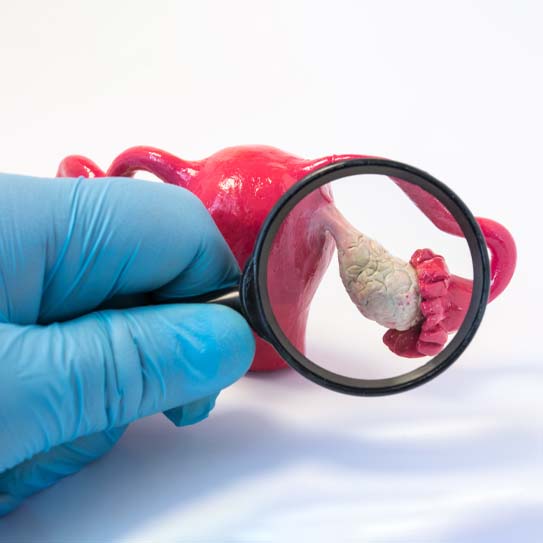
Select City
Pristyn Care is a reliable and trusted surgical provider. Our primary goal is to provide a seamless surgical experience to all patients at an affordable price. In order to deliver the best treatment, we use cutting-edge technology and USFDA-approved surgical procedures. Our gynecologists are highly skilled in providing the best course of treatment for ovarian cysts. Here are some reasons to choose Pristyn Care for ovarian cyst treatment in Bangladesh:

![function at() { [native code] }](https://img.pristyncare.com/treatment%20section%2FOvarian-Cyst.jpg)
Diagnosis and Treatment for Ovarian Cyst Treatment
If you are experiencing symptoms of an ovarian cyst, then your gynecologist may recommend diagnostic tests to confirm the diagnosis. Here are some of the most common methods used to diagnose ovarian cysts:
It’s important to remember that ovarian cysts are usually harmless and do not require treatment. However, if you experience symptoms such as severe pain, nausea or vomiting, or a fever, seek medical attention immediately as these symptoms may indicate a more serious problem.
The treatment for ovarian cysts depends on the size, type, and symptoms of the cyst. In many cases, ovarian cysts do not require treatment and may go away on their own. However, if the cyst is large, causing discomfort, or if there are other symptoms present, your gynecologist may recommend one of the following treatments:
It’s important to consult your gynecologist for the best course of treatment for your specific situation. In many cases, ovarian cysts are harmless and do not require treatment, but if you experience symptoms such as severe pain or discomfort, seek medical attention immediately.
Ovarian cysts are fluid-filled sacs that develop on or within the ovaries. They can occur at any age and are quite common in women of reproductive age. Here are some of the most common causes of ovarian cysts:
It’s important to note that most ovarian cysts are benign and do not require treatment. However, if you experience symptoms such as pain or discomfort, it’s important to consult your gynecologist.
There are several types of ovarian cysts, each with different causes, symptoms, and treatment options. Here are some of the most common types of ovarian cysts:
Ovarian cancer: Ovarian cancer can also cause the formation of cysts on the ovaries. These cysts may be solid or filled with fluid and may require surgery and/or chemotherapy for treatment.
Delivering Seamless Surgical Experience in Bangladesh
Pristyn Care provides consultation for 50+ diseases and treatments such as Piles, Hernia, Kidney Stones, Cataract, Gynecomastia, Circumcision etc. across 3+ major cities in Bangladesh.
Our surgeons spend a lot of time with you to diagnose your condition. You are assisted in all pre-surgery medical diagnostics. We offer advanced laser and laparoscopic surgical treatment. Our procedures are USFDA approved.
A dedicated Care Coordinator assists you throughout the surgery journey from insurance paperwork, to free commute from home to hospital & back and admission-discharge process at the hospital.
We offer follow-up consultations and instructions including dietary tips as well as exercises to every patient to ensure they have a smooth recovery to their daily routines.
Most cysts grow gradually except dermoid cysts. Dermoid cysts have the potential to become large and grow most rapidly. According to a case study, dermoid cysts potentially grow more rapidly as compared to other cysts.
No, most ovarian cysts are benign and asymptomatic and do not require any specific treatment as they usually dissolve on their own. However, in some rare cases, there is a chance of ovarian cysts turning into cancer which is usually common in women of post-menopausal age.
You must avoid eating food rich in carbohydrates, junk food, processed food, and any acidic food, as they can lead to hormonal imbalance and weakens the immune system. You should also avoid excess sugar and refrigerated food as it could prevent the removal of toxins and thus increase the risk of ovarian cysts.
Generally, cysts do not make it harder to get pregnant. However, if the cysts are caused by an underlying condition like endometriosis, you might have problems with fertility.
Before considering any treatment plan for an ovarian cyst, discuss your medical history and medication with the doctor and ask the following questions to understand the treatment procedure and the risks and complications associated with it-
Treatment of an ovarian cyst can provide relief from the pain and other symptoms like bloating, bleeding, and pelvic pain. However, the treatment procedure is linked with several risks and complications.
Cysts under 3 cm in size typically go away on their own and don’t need any special care. Cysts that are between 5-7 cm in diameter or greater begin to bleed and may need to be surgically treated. In some cases, ovarian cysts rupture and start causing internal bleeding. The risk of cyst rupture increases with cyst size. To understand the severity of the condition, you must consult with your gynecologist. Any delay in the course of treatment increases the chances of infection in an organ nearby and increases the likelihood of developing ovarian cancer.